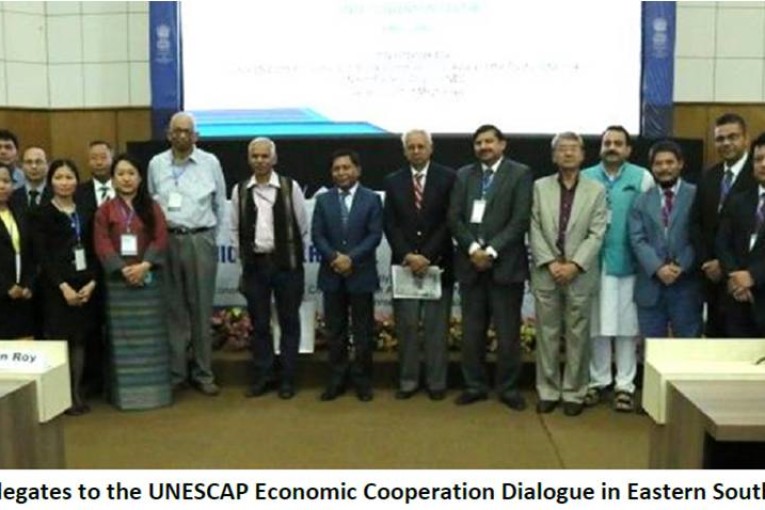
The vast and untapped development potential of border areas between Bangladesh, Bhutan, Myanmar, Nepal and India and the constraints to greater cooperation among countries in Eastern South Asia to transform these areas into dynamic regional hubs of trade and economic activity was the focus of a UNESCAP-led meeting that recently concluded in Shillong, north-eastern India.
Organized jointly with the Government of Meghalaya, India and the North Eastern Council, the Economic Cooperation Dialogue on Regional Connectivity and Border Special Development Zones in Eastern South Asia, held on 25-26 April 2016 at the State Convention Centre, Shillong, brought together over 400 senior officials from Bangladesh, Bhutan, Myanmar, Nepal and the North-Eastern states of India, regional experts, development partners, business organizations as well as other key stakeholders.
 The two-day event was organized as part of an initiative by UNESCAP to promote the socio-economic development of Eastern South Asian countries and support regional economic integration in that subregion, primarily by addressing development of land transport infrastructure and facilitation at the borders. The event contributed to preparation of policy roadmaps for economic development in these states adjacent to India and their respective border regions.
The two-day event was organized as part of an initiative by UNESCAP to promote the socio-economic development of Eastern South Asian countries and support regional economic integration in that subregion, primarily by addressing development of land transport infrastructure and facilitation at the borders. The event contributed to preparation of policy roadmaps for economic development in these states adjacent to India and their respective border regions.
Delivering the inaugural address at the Dialogue, Dr. Mukul Sangma, Chief Minister of Meghalaya noted that tourism, trade and investment in the subregion were steadily growing. “Many positive signs point towards a unique window of opportunity emerging in the subregion, which needs to be taken advantage of more aggressively.” “A key factor in this regard is to rethink our perception of these areas usually referred to as ‘remote’. India needs to look at its border areas as sources of economic growth”, Dr. Sangma stated, referring to the state of Meghalaya’s pioneer concept of Border Haats – or markets – and calling for strategic and uninterrupted infrastructure development projects for these areas.
Dr. Nagesh Kumar, Head, UNESCAP South and South-West Asia Office, in his opening remarks to the Dialogue noted that poverty and hunger remained high in South Asia and largely concentrated in border regions in spite of these regions’ tremendous economic potential. “The landlocked countries of Bhutan and Nepal, as well as the North-Eastern states of India face geographic constraints that could be converted into opportunities through the development of transport corridors giving them access to ports in Bangladesh and Myanmar.” He continued: “Rather than dividing people, borders should unite people and economies via regional economic integration.”
The Dialogue discussed research conducted by UNESCAP to explore the potential of “Border Special Development Zones (BSDZs)” that can take advantage of major transport corridors passing through the subregion to promote both industrial development and trade growth and help revive underdeveloped and isolated border localities. The research focused in particular on the border between Meghalaya, India and Bangladesh as trade relations between the two countries illustrate a typical case where BSDZs play an important role for improving bilateral trade and developing border areas. The discussion at the Dialogue also focused on the role of the private sector and development partners in facilitating key actions going forward.
In his special address to the Dialogue, H.E. Syed Moazzam Ali, High Commissioner of Bangladesh to India underscored that the potential for cooperation on border zones was enormous and that a change of mindset was direly needed. “Irreversible economic ties need to be forged between countries by ensuring that as many people as possible benefit from this cooperation,” Mr. Moazzam Ali stated. “This will sustain political will and ensure that successive changes of governments would not reverse such valuable initiatives.”
The meeting built on an earlier Policy Dialogue on Economic and Transport Development in Border Areas in Eastern South Asia held in 2013, also jointly organized by UNESCAP and the government of Meghalaya, which had underscored that closer cooperation around transport and transit facilitation between the North-Eastern states of India and neighbouring countries could allow Eastern South Asia to emerge as a hub of trade with ASEAN and East Asia, facilitate mutual trade, and serve as a pivot of India’s Look East Policy.



